#jack slash
Text
rating Parahumans guys on how well I think they'd be as parents
Brian: I think Brian would believe he is a great father, but there is too much repressed emotions and depression in there to properly care for and raise a child. 3/10, Not particularly good.
Alec: Alec has lacked a real positive parental unit in his life, and while I don't think he would purposefully be shitty to a kid, I think he might fall back on what he knows from his own youth. Might be a fun older brother though. 3/10, needs to focus on himself first
Danny Hebert: Too sad about his wife dying to properly parent. no further notes. 2/10, Danny please get it together Taylor is relying on you
Armsmaster: Would rub off his worst personality traits onto a kid, resulting in them being the average r/malelivingspace user. Might also encourage child to grow poor facial hair. 1/10, I feel bad for whatever unfortunate soul is consigned to this fate.
Coil: Coil would be an absent father for 90% of your childhood, unless you were useful for his plans. In that case, he would feed you drugs or some other unethical thing and make you work for him (child labor (bad)). 2/10, conditions are poor but you might get to meet some of the other children he has, fixing the playdate situation.
Kaiser: See in story results. -5/10 Nazis don't make good parents.
Uber and Leet: They come as a package deal obviously, and they are actually pretty okay parents, they aren't great obviously but they aren't tremendous failures either. That is until you show up on one of their livestreams and then you are the laughingstock of the school. 4/10 Don't upload your kids online.
Scion: Too sad about his wife dying to properly parent. Also not emotionally available. 1/10, get it together man people are relying on you.
Mark Dallon: Not necessarily a bad parent, but he has a laundry list of problems that he needs to work through before he can begin to think to focus on his kids. 3/10, he's trying by god. He's not doing good but he's trying.
Number Man: He would probably respond to any question his kid asks with some weird philosophical math metaphor. Is a killer cook though. Also math classes would be a breeze. Unfortunately, most of his time is dedicated to cauldron. 5/10, grades will be great.
Accord: The worst type of helicopter parent. He would make itineraries to follow any time his kid went out and would require them home in pristine condition super early. Has a rigorous study schedule and puts a lot of pressure on you to succeed, and you know he wants whats best for you but like its stifling and you aren't really living for you but for him. Sure grades are good but you just can't do it anymore. 4/10, the depression and GPA are soaring.
Jack Slash: As seen in Worm, he is an absolutely killer parent. Has a fun family vibe? check. Engages with his children's interest and allows them to pursue it? check. Keeps his child intellectually and creatively stimulated? check. Takes his family all over the country to see new exciting places and people? check. Dude is simply top tier on the parenting skill. Sure the family dynamic is a bit unorthodox, but when the results look this good can you really argue? 10/10 Jack Slash has got it going on.
#inspired by all those weird reddit threads talking about if Taylor would be a good mother#why is that such a popular discussion?#geniunely I don't understand#worm#parahumans#wormblr#jack slash#armsmaster#number man#accord#scion#alec vasil#brian laborn
196 notes
·
View notes
Text

He's getting lines on his face
259 notes
·
View notes
Text
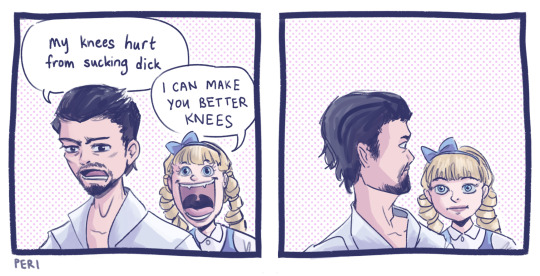
476 notes
·
View notes
Text
under king, people saw the slaughterhouse nine as nightmares.
under jack slash, people saw the slaughterhouse nine as natural disasters.
he molded the public consciousness to the point where a group of serial killers were seen as an inevitable, unstoppable tragedy you can only weather and mitigate but never truly defeat. he made them into a fact of american life.
I want to sink my teeth into the concept like a feral sibby into flesh, because it's just so damn interesting. jack slash personally affected the collective trauma of a huge subset of earth bet's population. from the culture around small towns to the truce being extended beyond endbringers, he contributed to so many aspects of what makes bet's north america so unique and multifaceted.
jack slash left marks more like scars on people he never even met. he made history, and I suppose that means you could argue he won even in death.
what a monstrous, fascinating man.
225 notes
·
View notes
Text
Worm and other media that won't just let you shoot the Joker, part 1:
Worm comments on the structure of stories, especially superhero stories, in some interesting ways. There's a lot of stuff that happen in superhero comics for no real reason than that it needs to happen for the story to be interesting; a huge amount of Worm's worldbuilding is devoted to taking these things and making the fact that they have to happen an explicit in-setting constraint. For instance, superhero stories tend to have more powerful heroes face off against much more powerful villains than their less-powerful allies, to the point where it seems like super-powerful threats are coming to earth every few weeks just because it wouldn't be interesting to read that comic otherwise. It gets weirder when you compare what villains end up visiting the cities of uber-powerful heroes vs the cities of less powerful heroes: Gotham mostly just has to deal with serial killers while Metropolis is a magnet for evil gods. Worm plays with this by having the Endbringers exist only because the big hero needed something to fight in-text: it changes "powerful heroes need powerful villains or else it wouldn't be interesting" from a Doylist justification to a Watsonian one. Then there's the fact that so much of the horrible conflict in Earth Bet is explicitly caused by Gods making sure the powers they grant people lead to increased conflict, the fact that one of the most powerful characters does what she does because the plot path to victory says she needs to, etc.
But the big one is Jack Slash, and how he's only able to get away with his bullshit because he has plot armor as a secondary power. As WB says here, "Jack's a reconstruction of the Joker type character in the sense that you can't have such a character take such a high profile position in the setting, without having there be a cheat." The Joker and similar characters are only able to keep being relevant threats in their stories because the narrative bends to let them win and stops them from being killed. Jack Slash is only able to keep being a relevant threat because his power makes the universe bend to let him win in the same way. Not only does this make for an interesting obstacle (its almost like they're fighting an authorial mandate!), but it skewers the use of similar character's plot armor and how unrealistic and unsatisfying it makes their stories.
But wait, what does it mean for a story to be "unrealistic" in the context of superpowers? Is being unrealistic in those contexts actually a problem? For that matter, what does it mean for a narrative to bend to let someone win? Its not like there's an objective way fighting the Joker would go, which the author is deviating from by letting him survive.
[Stuff under readbelow contains spoilers fo, the movie Funny Games and the book Anybody Home?]
Maybe we could say that if characters like the Joker were real, and put in the situations they are in their stories, they would end up being killed really quickly. But is that a reasonable way to judge stories? A narrative where such a character is killed unceremoniously to satisfy a need for realism isn't any less an expression of the author's deliberate choices than a story where the character keeps showing back up to satisfy a desire for fan-favorite characters. And while Jack Slash's arcs help show why deviating from "realistic consequences" in the service of keeping a character alive can make a story exhausting and screw with an audiences' appreciation of stakes, it doesn't make a strong case against the concept of villains having plot armor in general. A story isn't necessarily worse just for being constructed to keep the villains alive—all stories are constructed, and sometimes being constructed that way makes for the best story.
That becomes more clear when you take the premise of Jack Slash as "killer who wins because the mechanics of the universe says so" and make clear just how much "the mechanics of the universe" really just means "the story". Which is how you get Peter and Paul from Funny Games.
I'd highly recommend watching Funny Games (though for the love of god check content warnings), as well as Patricia Taxxon's review of it that I'm cribbing a lot from here. But to summarize, Funny Games is a movie written and directed by Michael Haneke about a family's lakeside vacation being interrupted by the appearance of two murderous young men, who capture them in their own house and slowly torture and kill them off. At least, that's what it seems to be about initially. It marketed itself as a somewhat standard entry in the genres of torture porn and home invasion thrillers, and played itself straight as one for the majority of its runtime. But then one of the two villains of the pair, "Paul," starts talking to the audience.
It starts small: after crippling the family's father and revealing that he killed their dog, Paul has the wife look for its corpse outside. While giving her hints, he slowly turns back towards the camera and smirks, before turning back. In isolation, maybe it could be interpreted as Paul smirking at Peter, seeming to look out at the audience only because of clumsy blocking. But then it happens again. Paul tells the family, who are completely at their mercy at this point, that they're gonna bet that they'll all be dead within twelve hours. When the family refuses to take the bet, asking how they could hope to win it when he can clearly off them all whenever they wish, Paul turns towards the audience and asks "what do you think? Do you think they stand a chance? Well you're on their side aren't you. Who you betting on, eh?" The audience is being acknowledged; their role as someone invested in the story is being examined by the ones introducing the stakes.
youtube
But the biggest moment comes near the end, when the mother grabs the shotgun she's being threatened with and blasts Peter. Paul startles, grins, and then hurredly grabs a tv remote and presses rewind. The movie itself suddenly rewinds to right before the mother grabs the gun, and plays again with Paul grabbing the shotgun right before the mother reaches for it.
Its a truly incredible moment, in that its the perfect way to forcibly take away the audience's suspension of disbelief. It forces the audience to acknowledge that they're viewing a story, not something happening to a real family. After their moment of catharsis against the villains, Paul makes the confront the fact that the movie will end however the creators want it to, and if they want the villains to win they'll will regardless of how little sense it makes. Fuck you, we can go from being set in the normal world with normal rules to the villains traveling back in time with a tv remote, because a story does whatever its creators want. Haneke just decided to make that obvious in the most jarring way imaginable.
But maybe the best way to illustrate Funny Games effectiveness at this type of artful unveiling is comparing it to its less-effective imitators. I've recently finished Anybody Home?, a recently-published book by Michael J. Seidlinger. It has the conceit of being narrated by an unnamed mass-murderer, guiding a new killer in their first home invasion. I started reading it before I watched Funny Games, and even afterwards took a while to realize the unnamed narrator wasn’t just a pastiche of a Paul-like character but was actually supposed to be read as Paul himself. Seidlinger was having his book be a sort of unofficial sequel to Funny Games, narrated by its star. Once I realized, a lot of the books details suddenly clicked. The big one was the constant references to “the camera" and the idea of murder being a performance for an audience, one that needed to be fresh and original to make “the cults” enjoy it. Take these passages from page 77:
If it happened, it would perturb. It would create suspicion. It wouldn’t end up ruining the performance, and yet, it could have derailed our casing. The camera can have all it wants; either way, it’ll make it look better than it really was. It’ll strip away the cues and other planned orchestrations and it’ll show the action—the actuality of each scene, each suggestion…
This is a spectacle, above all. The craft pertains to keeping and maintaining a captive audience; behind the camera, you’ll never know how it happened—the trickery that made the impossible possible, the insanity so close to home. It is spectacle.
Through online activity, the son made it clear that something is happening at home, yet we cannot be certain if he has noticed the camera.
These all point to the idea that the murders are being viewed by an audience rather than just by intruders, that this is a performance for said audience's benefit more than anything else. But notably, it also reinforces the idea of these characters having an existence outside of the camera: the camera shows the action and "strips away" the cues behind it, the victims have a life outside the camera such that they could plausibly sense that the camera is now here. The victims are sometimes described as playing into their role, but always metaphorically; always as if normal people start acting like characters when put in certain circumstances. Whereas Funny Games posits that characters will behave however the author wants them to, denying the claim that stories are realistic simulations of hypothetical scenarios.
The whole thing is predicated on the idea that there needs to be a guide, that the villain of a home invader movie is really in danger of something going wrong. Paul/The narrator keeps giving directions on what needs to be double checked, what needs to X, and its completely against the spirit of the role Paul served in Funny Games. If something goes wrong for the villain they should just be able to rewind and do it over, because the story was written for them to succeed. Anybody Home? throws out Funny Games theme of the story being on rails, of the winner being whoever the author wants it to be and the events following whatever the author wanted rather than what would "really" happen. It throws out the whole idea that it’s all just a story, by supporting the idea that the characters have lives not captured by the camera—or more relevantly, not captured on-page.
Because Seidlinger using the language of film in a book leads to different things going on with the fourth wall. The way Funny Games and Anybody Home? make the camera explicit are just different, and the former does it much more interestingly than the latter. Seildinger’s characters aren’t looking back at the reader, the fourth wall is never actually breached. Funny Games has Paul look into the camera to address the audience, making clear how it’s a story being set up for the audience's benefit. Anybody Home? invokes the idea of a camera tracking everything home invaders do in general, having it be a third-party force that’s itself an unseen character contained within the story, observing the intruder's crime rather than the reader. Why is it still a camera, if we're in a book rather than a movie? A character in a book talking about a camera watching them does not convey any of the same meaning as a character in a movie suddenly looking into a camera and smirking at the audience!
By the end, you realize that this is caused in part by the book's bizarro take on how horror movies exist in this world. It reveals that in its setting, all horror movies are adaptations of real home invasions, which get recorded by unseen mysterious forces. Killers enter a home and enact violence, are filmed by some supernatural camera, the footage gets leaked to the public, and then the killers sell the rights to the work to studios. The events of SAW really happened, but the movie was just an adaptation. Funny Games really happened, but the Paul in the movies was just an actor playing the Paul narrating this book. The killer's victims eventually realize that they're "victims," but not in the sense that they realize their characters in a story, only in a sense that they realize they got sucked into their world's magical realism bullshit.
Ultimately, while the book does the same trick of being all about how horror stories are “for” us, it gets rid of all the tricks that made it work for Funny Games. It even strips it's in-universe version of what made it special; Funny Games is just another adaptation of a real home invasion. All the meta stuff that makes it interesting in its genre are just gestured at as aesthetics.
So what makes Jack Slash in Worm succeed where the killers in Anybody Home? fail? Both are constructed to be entertaining for a 3rd party who stand-in for but aren't actually the audience; the entities in Worm, the cults in Anybody Home?. But Jack Slash doesn't mix his metaphors. Worm may turn various real-life factors affecting a work into in-story mechanisms of the world in the same way Anybody Home? does. But it doesn't also base itself off a text that takes in-story mechanisms and breaks them to force the audience to see the various real-life factors affecting the work. In effect, WB pulls off a trick Seidlinger tries and fails because WB wasn't taking another metatexual story and stripping it of what made it interesting.
Though that introduces the question: can such meta-moves be mixed? Can you have a text where story conceits become explicit plot mechanics the characters are aware of, while also having characters really look at the camera and tell the audience that its all just a story? Can you actually sell it and make it something interesting?
There is one story that tries this. I don't know if it pulls it off, but it certainly makes a lot of interesting moves that create a fascinating whole. It even comments on the Joker in the same way Worm does, having a character who seemingly cant die because the roll they play in the story is too impor—
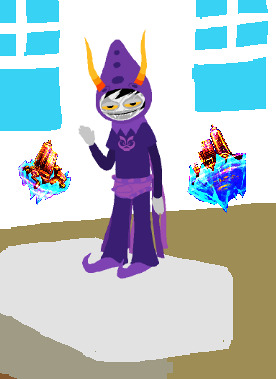
Ah fuck.
Continued in part 2.
#wormblr#wildbow#jack slash#parahumans#metafiction#funny games#michael haneke#anybody home?#michael j seidlinger#mals says#mals reads worm#Youtube
128 notes
·
View notes
Text

She’s got a few screws loose.
#parahumans#wildbow#worm web serial#worm#worm parahumans#wormblr#jack slash#riley grace davis#bonesaw
151 notes
·
View notes
Text

Love how Jack Slash has his little bastard cheater power that does what Taylor says and makes people hesitate at critical junctures, its his armor and the thing that keeps him going even though he thinks he's getting by on charisma and reputation, and Taylor essentially does his style just like him but better. Like she takes so much inspiration from him. She's great at getting into people's heads with her words, people are afraid of her because of the reputation she carefully cultivated, she appears completely unfazed even when she's hopelessly outmatched because she copies his confidence. But the key difference is that Jack couldn't actually survive with his confidence and reputation and charisma. He has them, yes, but without Broadcast he'd be dead years ago. Taylor sees traits that are backed up by an incredibly powerful superpower and she copies and improves upon them so well and so effectively that she makes Jack's facade her own reality.
#worm#parahumans#skitter#taylor hebert#jack slash#genuinely unsure if this one makes any sense I'm kinda zonked on sleepyness#also love how she says “his power didnt make anybody shit their pants”#as a way they're similar#as if she isn't the most terrifying cape in the country
276 notes
·
View notes
Text

healthy fathers with promising daughters, just happy feelings all around
84 notes
·
View notes
Text
Jack Slash long distance top surgery send post
67 notes
·
View notes
Text
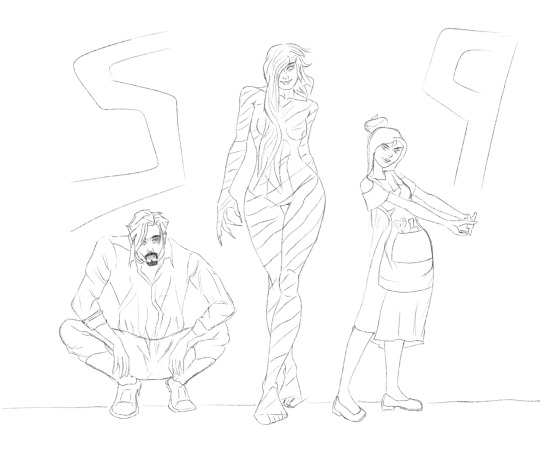
Jack Slash, Siberian, and Bonesaw
60 notes
·
View notes
Text

Jack Slack just wants to smoke weed and watch Shark Week, leave him alone!!!
#parahumans#wildbow#ward#ward web serial#worm#wardblr#worm web serial#wormblr#shark week#Jack Slack#Jack Slash
57 notes
·
View notes
Text
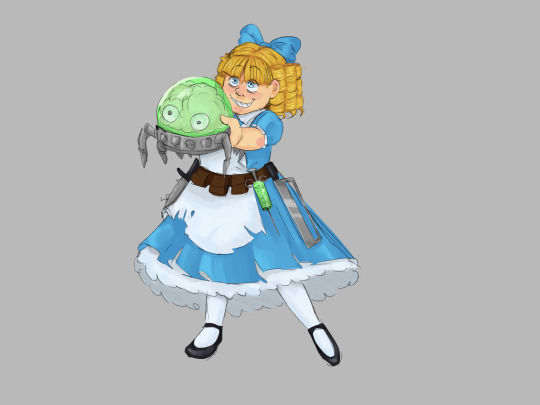

i have not drawn worm stuff in forever
#just some doodles lol#bonesaw#jack slash#springtrap#worm#parahumans#my art#fanart#fnaf#five nights at freddy's#doodles
224 notes
·
View notes
Text
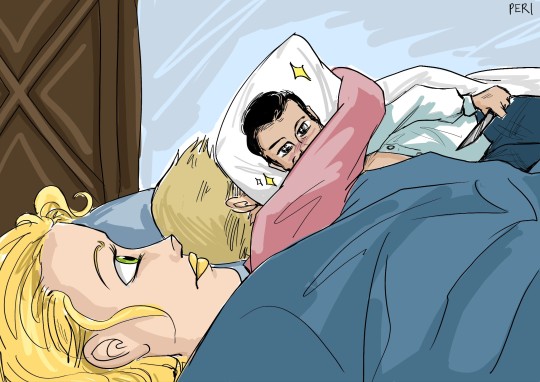
ah yes. me. my husband. and his $500 5ft-tall dakimakura of jack slash.
105 notes
·
View notes
Note
I prompt you to elaborate on the idea of deliberately making something in a story boring, for I an always interested in your analysis.
In The Boys (Comic version, which I have complicated but more-positive-than-most feelings about) Garth Ennis very deliberately wrote most of the superhuman combat scenes as short, brutal affairs in which whoever was more powerful or better-equipped would just slaughter the other side in a matter of seconds; if the sides were more evenly matched it was then a matter of who swung first. To my memory, there were only a handful of fights blocked like fights instead of like curbstomps. This was in service to Ennis's artistic vision; violence as a swift, brutal thing, only glamourous in the sense of black-comedy dismemberments or the grim satisfaction of being alive when the other guy isn't, and with the majority of all conflicts playing out through via prep-work and intelligence-gathering done in advance of the first punch being thrown.
It was an aggressive refutation of how superhero fights go in more straightforward superhero fiction, with clever tricks, drawn-out dramatic brawls, violence as a palatable form of spectacle, something marketable after-the-fact. A lot of the fights the titular team got involved in consisted basically of jumping distracted supes; one of Homelander's jobs was to just unceremoniously decapitate any earnest upstart supervillain and then have the marketing team at Vought write a comic portraying the fight as something with genre-typical stakes. To this day, I feel like there was a level of honesty about violence in this portrayal. In real life, it's not fun!
But! It did introduce some problems. Namely, a series in which almost every single fight is something Nasty, Brutish and Short created, for me, a form of doublethink about how seriously we should even take the Vought capes as threats. A series in which every fight is deliberately uninteresting (if you aren't entertained by curbstomps) is a series in which every fight is deliberately uninteresting, and from there your enjoyment of the series rides or dies on how interesting you find the non-fight political intrigue, character dynamics, and so forth. The version of Garth Ennis who isn't writing capes is, in my opinion, pretty damn good at that other stuff, so I inched through.
The show patched the majority of my difficulties. It retained the broad thesis that cape fights would largely be curbstomps, and the other broad thesis that capes would largely be useless or counterproductive at their supposed role, but combined this with a number of actual fight scenes. It made Butchers team significantly less powerful, with a significantly greater focus on the sneaky bastardry necessary to flip assets and find weaknesses. It made killing any given supe much, much more of an endeavor, something genuinely very difficult and impressive, and it made every given supe death much more of a plot point or a character beat than it would have been in the comic. The supes being less interesting than typical for their genre, that was preserved- but the situations involving supes that we, the audience, are privy to? All very interesting still!
Now on the other side of the spectrum, you've got Worm, and you've got Jack Slash-as-an-examination-of-Joker. "Your philosophy is ill-considered and fake deep, and you aren't funny" is actually a fairly common clapback against The Joker within officially published DC comics properties, but it butts up against the fact that he's taken pretty seriously as a threat regardless of that fact! Jack Slash is an attempt to reconcile that, to figure out how someone as LOlrandom as Joker could last longer than three minutes as a serious contender, and the answer is "subtle secondary powers that puff up his win rate, in a way that his self-absorption prevents him from recognizing as anything but his own innate talent." He's blatantly shallow. Everyone talking to him is palpably rolling their eyes within the text, but he's got the brute-force necessary to undercut anyone trying to one-up him (Theo's interlude, Tattletale in the parking garage.) It's called out multiple times that's it's mysterious that he's doing so well when he's so mediocre. The candidate he picks for the 9 is a dud. He can't come up with anything more interesting for Cherish than having her do all the other tests over a second time. His big comeback is just Slaughterhouse 9! But More of them! Fuck Yeah!
But! Despite the text being aware of how shallow he is and how thin his ideas are, all of his ideas keep working. It doesn't matter that it's edgelord bullshit- it's edgelord bullshit that everyone else is forced to take seriously and respond to, which is where the actually-great character work in the S9 arc happens. And at this point I think there are basically two camps within the audience. Camp one consists of people who, despite Jacks clear shallowness, nonetheless are entertained and engrossed by the batshit combat scenarios he masterminds, even if he shouldn't be able to mastermind them. I am a counselor at Camp One. Camp Two consists of people who call bullshit on the ability for such a shallow guy to mastermind all that crap and bend everyone to his will, who don't really find anything redemptive in the eventual reveal that it was powers-enabled because they still had to sit through the implausible bullshit. This is a position I have no choice but to respect because it's the position of my cousin, who I adore and want to remain on good terms with at family gatherings. The things we do in service of family, amiright
#parahumans#worm#wildbow#the boys#garth ennis#asks#ask#meta#thoughts#the boys amazon prime#worm web serial#worm web novel#jack slash#media analysis#the boys comic#worm analysis#worm spoilers#the boys spoilers
303 notes
·
View notes
Text
another parallel i noticed in worm between Jack and Taylor is that they both have no upper limit to a specific aspect of their powers
Jack has no upper limit on the range of how far away something has to be for him to cut it
and Taylor has no upper limit to how many bugs she can control
now i don't have the analytical skills necessary to make a whole paragraph about it so I hope somebody else does the rest of it for me
920 notes
·
View notes
Text
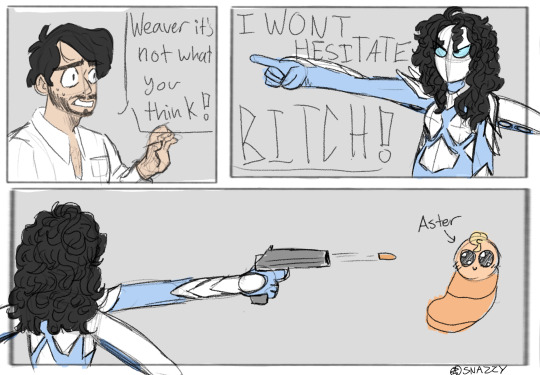
I drew this because my girlfriend gave me the idea, top tier shit post time ig
#character art#worm parahumans#parahumans#skitter#taylor hebert#jack slash#aster#gun#Taylor sweetie no#don’t shoot the child#I’m going to hell for making this#at least I’ll see Taylor down there
226 notes
·
View notes